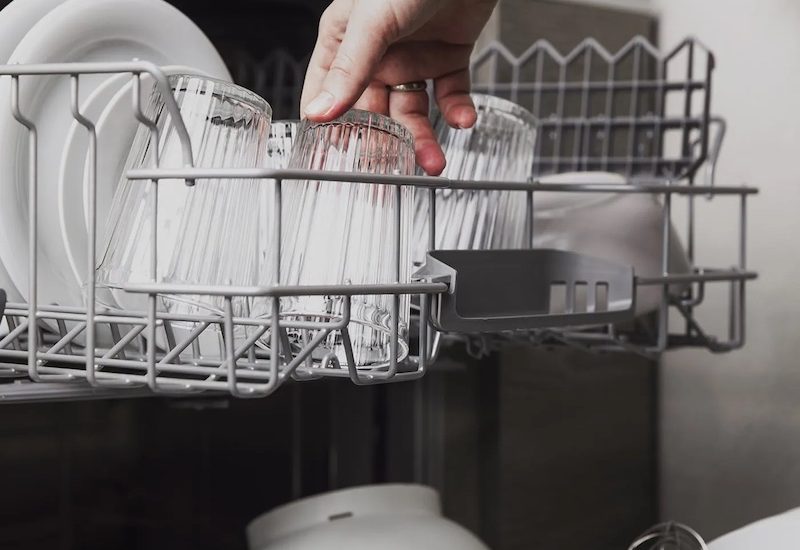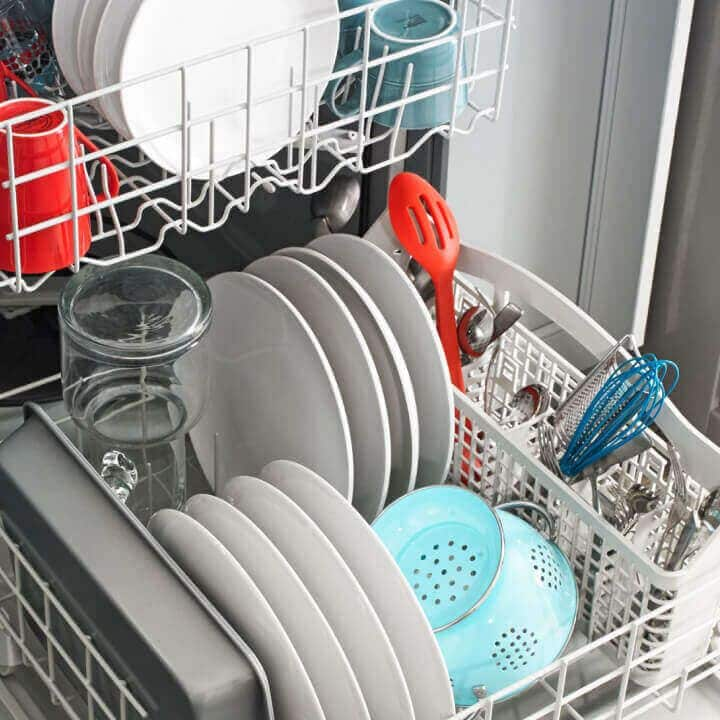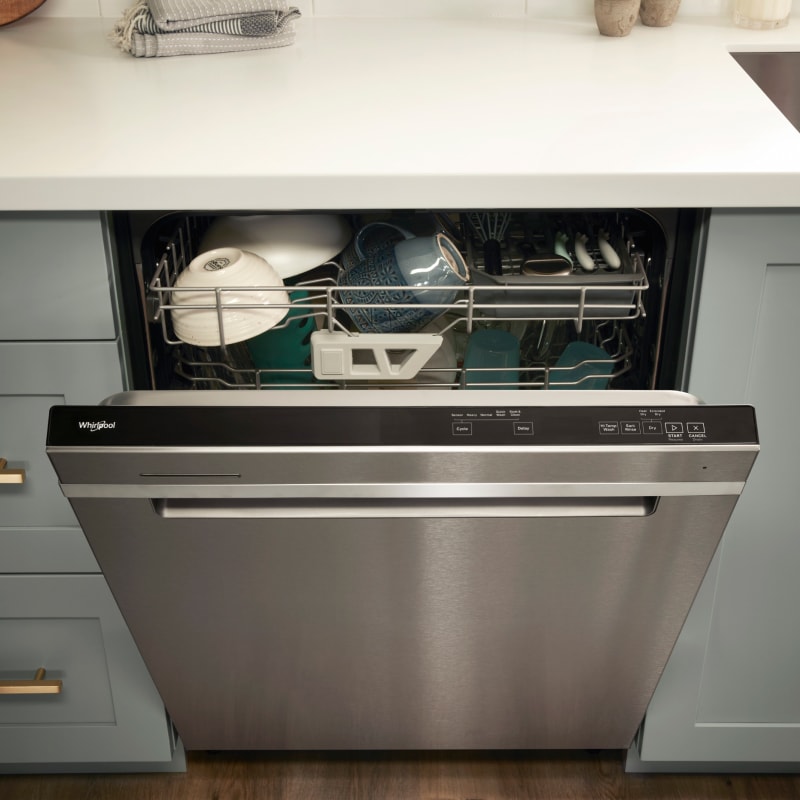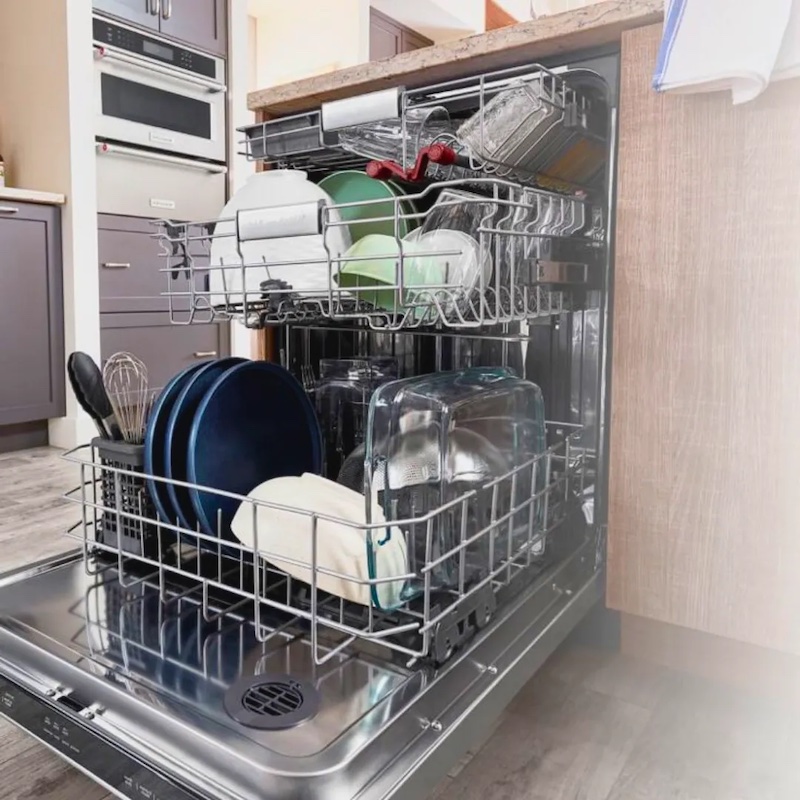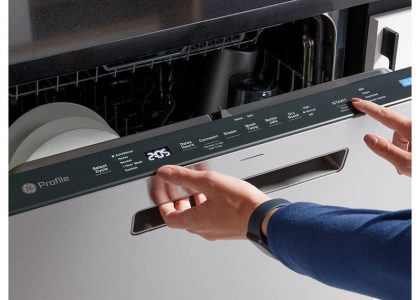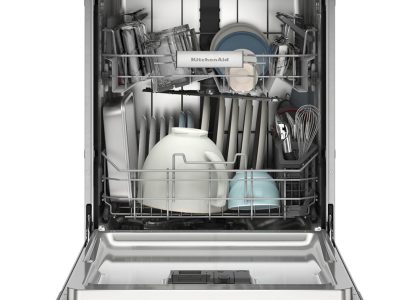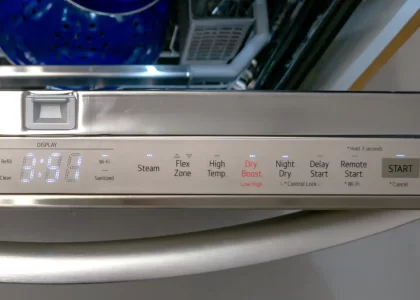Common Reasons Your Dishwasher Isn’t Drying Properly
When you ask ‘why is my dishwasher not drying,’ you’re facing a common problem. Let’s explore some reasons.
Insufficient Rinse Aid
Rinse aid plays a key role in the drying process. It lowers the surface tension of water, speeding up drying. If you notice dishes are wet, check the rinse aid dispenser. Ensure it’s filled up and dispensing correctly. Most dishwashers have an indicator that shows the level of rinse aid.
Malfunctioning Heating Element
The heating element in your dishwasher heats the air inside. This helps evaporate moisture from your dishes. If it’s broken, dishes won’t dry as they should. You can check the element for visual signs of damage. However, for a precise diagnosis, using a multimeter is best. Remember to disconnect power before checking.
Overloading the Dishwasher
Packing too many dishes into your dishwasher can block air flow. This prevents heat from reaching all items. Make sure there’s enough space between dishes. This will allow the hot air to circulate properly, aiding in better drying.
There could be several reasons why your dishwasher is not drying properly:
- Not using rinse aid: Rinse aid helps water to sheet off dishes, preventing water droplets from forming and improving drying performance. Make sure to refill the rinse aid dispenser if it’s empty.
- Inadequate heating: The heating element in the dishwasher may be malfunctioning, preventing the water from getting hot enough to evaporate effectively. This could be due to a faulty element or thermostat.
- Overloading the dishwasher: Overloading the dishwasher can prevent proper air circulation, leading to ineffective drying. Try reducing the amount of dishes in each load to see if this helps.
- Clogged spray arms: Check to see if the spray arms are clogged with debris, which can hinder the water from reaching all the dishes, and therefore lead to ineffective drying.
- Using the wrong cycle: Some dishwasher cycles may not include a drying phase, so make sure you are using a cycle that includes a drying function.
If you have checked all of these potential issues and your dishwasher still isn’t drying properly, it may be time to contact a professional appliance repair technician for further assistance.
Improving Dishwasher Drying Effectiveness
To make sure your dishes come out dry, follow these steps.
Importance of Rinse Aid and How to Refill It
Rinse aid is crucial for dry dishes. It keeps water from forming droplets that stick. Check the dispenser often and refill as needed. Your dishwasher’s manual can show how to add rinse aid. Keep the dispenser clean to avoid clogs. A full dispenser means better drying.
Proper Loading Techniques to Enhance Drying
How you load dishes affects drying. Place them so air can flow around each piece. Tilt bowls and cups to stop water pooling. Don’t let large items block smaller ones. This helps hot air reach every dish. Proper loading leads to better drying.
Checking and Cleaning the Vent and Fan
Your dishwasher has a vent and fan for drying. These parts release the hot, moist air. If the vent or fan is blocked, dishes stay wet. Check these parts for blockages and clean them. Use a soft brush or cloth to gently wipe away debris. A clear vent and fan improve drying effectiveness.
Maintenance Checks to Keep Your Dishwasher in Optimal Condition
Routine maintenance is key for a dishwasher that works well and dries without issues. Here’s what to focus on.
Regularly Cleaning the Filter
A clogged filter can cause problems. It can block heat and lower drying effectiveness. It’s simple to clean. First, remove the filter according to your dishwasher’s guide. Use a soft brush and soapy water to clean it thoroughly. After cleaning, put it back correctly. Aim to clean the filter every month or more if you use the dishwasher often.
Inspecting the Spray Arms for Clogs
Spray arms distribute water during a wash. Clogs can prevent proper functioning and affect drying. Look for food particles or debris. These can block the nozzles. You can use a toothpick to clear any blockages you find. Keeping the spray arms clean ensures better dishwashing and drying.
Ensuring Proper Water Temperature
Your dishwasher needs hot water to clean and dry effectively. Too low a temperature can result in dishes coming out damp. Check your water heater’s setting. It should be around 120-150 degrees Fahrenheit. Also, let the hot water run in your sink before starting the dishwasher. This ensures the first fill of water is hot, helping with better cleaning and drying. Consider these checks a part of regular maintenance. Keeping your appliance in top condition means you are less likely to ask ‘why is my dishwasher not drying’.
Settings and Cycles for Optimal Drying
To resolve issues around ‘why is my dishwasher not drying,’ adjust settings and cycles. These can lead to better drying results. Here’s what to do.
Utilizing ‘Heat Dry’ and ‘Extra Dry’ Settings
Most dishwashers have ‘Heat Dry’ or ‘Extra Dry’ settings. Use them to boost drying power. ‘Heat Dry’ uses more heat at cycle end. ‘Extra Dry’ extends the drying phase. Use these settings for drier dishes.
- Choose the ‘Heat Dry’ option for added warmth.
- Select ‘Extra Dry’ for longer drying. This helps on humid days or with plastic items.
- Read the manual to understand how these settings work on your model.
The Benefits of ‘Sanitize’ Cycle on Drying
The ‘Sanitize’ cycle has two main benefits:
- Kills bacteria on dishes: It uses high temperatures to sanitize.
- Improves drying: The extra heat also helps water evaporate faster.
Use ‘Sanitize’ for a double advantage of cleaner and drier dishes. Remember to check dish labels for the ‘Sanitize’ safe icon beforehand. This cycle can help solve the ‘why is my dishwasher not drying’ issue effectively.
Innovative Add-Ons and Accessories
Enhancing your dishwasher’s drying ability can be as simple as using innovative add-ons and accessories. These extras can make a big difference in getting your dishes dry.
Dishwasher Safe Drying Agents
In addition to rinse aid, there are drying agents safe for use in dishwashers. These agents help reduce water spots and speed up drying. You can find them in stores. They come as liquids or pods. Follow the package directions on how to use them. Always ensure they are safe for your dishwasher model before starting.
Aftermarket Modifications to Improve Drying
If you’re still asking ‘why is my dishwasher not drying,’ consider aftermarket modifications. Some products can enhance airflow or heat distribution inside the dishwasher. These might include vent improvements or accessory fans. Look for trusted brands that match your dishwasher type. It’s important to research and ensure they will not void your warranty.
When to Call a Professional
Sometimes, despite our best efforts, a professional’s help is needed. Here’s when you should call for help.
Signs of Serious Dishwasher Issues
Not all dishwasher problems can be solved at home. Here are clear signs you need a professional:
- Persistent Bad Odors: If cleaning doesn’t remove bad smells, call for help.
- Water Leaks: Visible leaks can indicate serious internal faults.
- Electrical Issues: Flickering lights or non-responsive controls are safety risks.
- Noises During Operation: Loud or unusual noises suggest mechanical issues.
- Ineffective Washing and Drying: If dishes remain dirty or wet after troubleshooting, professional help might be needed.
Recommendations for Quality Repair Services
Choosing the right service is important. Follow these tips:
- Look for Certified Technicians: Ensure they are qualified to fix your dishwasher brand.
- Check Reviews: Read online testimonials to gauge service quality.
- Service Warranty: Opt for services that offer guarantees on repairs.
- Ask for References: Get referrals from satisfied customers.
- Compare Prices: Ensure you are getting a fair rate for the service provided.

